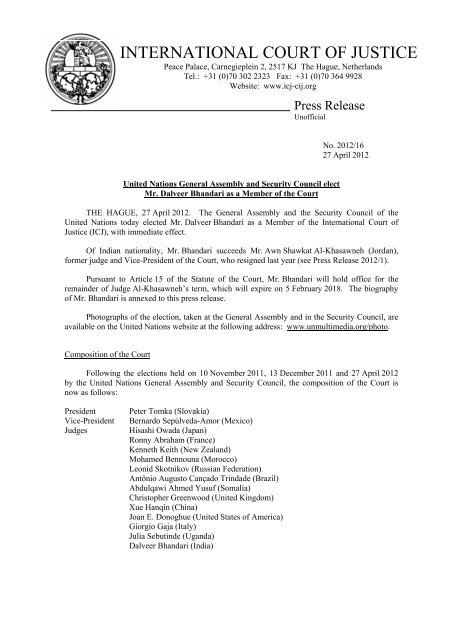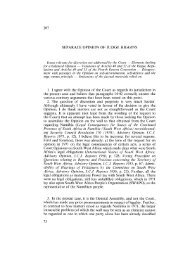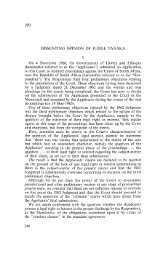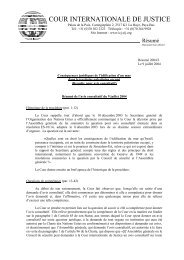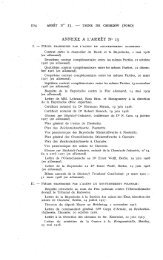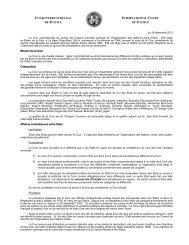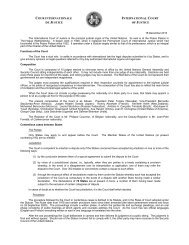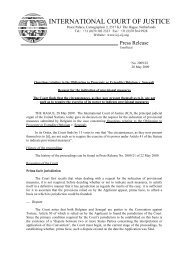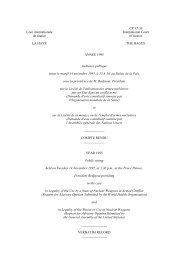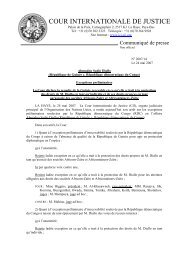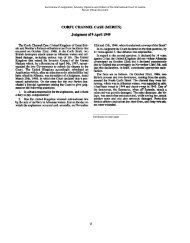INTERNATIONAL COURT OF JUSTICE
INTERNATIONAL COURT OF JUSTICE
INTERNATIONAL COURT OF JUSTICE
Create successful ePaper yourself
Turn your PDF publications into a flip-book with our unique Google optimized e-Paper software.
<strong>INTERNATIONAL</strong> <strong>COURT</strong> <strong>OF</strong> <strong>JUSTICE</strong><br />
Peace Palace, Carnegieplein 2, 2517 KJ The Hague, Netherlands<br />
Tel.: +31 (0)70 302 2323 Fax: +31 (0)70 364 9928<br />
Website: www.icj-cij.org<br />
Press Release<br />
Unofficial<br />
No. 2012/16<br />
27 April 2012<br />
United Nations General Assembly and Security Council elect<br />
Mr. Dalveer Bhandari as a Member of the Court<br />
THE HAGUE, 27 April 2012. The General Assembly and the Security Council of the<br />
United Nations today elected Mr. Dalveer Bhandari as a Member of the International Court of<br />
Justice (ICJ), with immediate effect.<br />
Of Indian nationality, Mr. Bhandari succeeds Mr. Awn Shawkat Al-Khasawneh (Jordan),<br />
former judge and Vice-President of the Court, who resigned last year (see Press Release 2012/1).<br />
Pursuant to Article 15 of the Statute of the Court, Mr. Bhandari will hold office for the<br />
remainder of Judge Al-Khasawneh’s term, which will expire on 5 February 2018. The biography<br />
of Mr. Bhandari is annexed to this press release.<br />
Photographs of the election, taken at the General Assembly and in the Security Council, are<br />
available on the United Nations website at the following address: www.unmultimedia.org/photo.<br />
Composition of the Court<br />
Following the elections held on 10 November 2011, 13 December 2011 and 27 April 2012<br />
by the United Nations General Assembly and Security Council, the composition of the Court is<br />
now as follows:<br />
President<br />
Vice-President<br />
Judges<br />
Peter Tomka (Slovakia)<br />
Bernardo Sepúlveda-Amor (Mexico)<br />
Hisashi Owada (Japan)<br />
Ronny Abraham (France)<br />
Kenneth Keith (New Zealand)<br />
Mohamed Bennouna (Morocco)<br />
Leonid Skotnikov (Russian Federation)<br />
Antônio Augusto Cançado Trindade (Brazil)<br />
Abdulqawi Ahmed Yusuf (Somalia)<br />
Christopher Greenwood (United Kingdom)<br />
Xue Hanqin (China)<br />
Joan E. Donoghue (United States of America)<br />
Giorgio Gaja (Italy)<br />
Julia Sebutinde (Uganda)<br />
Dalveer Bhandari (India)
- 2 -<br />
For more information on the composition of the Court, the way in which candidacies are<br />
submitted and the election procedure, please refer to Press Release 2011/34, which can be found on<br />
the Court’s website (www.icj-cij.org) under the heading “Press Room”.<br />
___________<br />
The International Court of Justice (ICJ) is the principal judicial organ of the United Nations.<br />
It was established by the United Nations Charter in June 1945 and began its activities in<br />
April 1946. The seat of the Court is at the Peace Palace in The Hague (Netherlands). Of the six<br />
principal organs of the United Nations, it is the only one not located in New York. The Court has a<br />
twofold role: first, to settle, in accordance with international law, legal disputes submitted to it by<br />
States (its judgments have binding force and are without appeal for the parties concerned); and,<br />
second, to give advisory opinions on legal questions referred to it by duly authorized United<br />
Nations organs and agencies of the system. The Court is composed of 15 judges elected for a<br />
nine-year term by the General Assembly and the Security Council of the United Nations. It is<br />
assisted by a Registry, its international secretariat, whose activities are both judicial and diplomatic,<br />
as well as administrative. The official languages of the Court are French and English.<br />
The ICJ, a court open only to States for contentious proceedings, and to certain organs and<br />
institutions of the United Nations system for advisory proceedings, should not be confused with the<br />
other ⎯ mostly criminal ⎯ judicial institutions based in The Hague and adjacent areas, such as the<br />
International Criminal Tribunal for the former Yugoslavia (ICTY, an ad hoc court created by the<br />
Security Council), the International Criminal Court (ICC, the first permanent international criminal<br />
court established by treaty, which does not belong to the United Nations system), the Special<br />
Tribunal for Lebanon (STL, an independent judicial body composed of Lebanese and international<br />
judges, which is not a United Nations tribunal and does not form part of the Lebanese judicial<br />
system), or the Permanent Court of Arbitration (PCA, an institution founded in 1899, which is<br />
independent of the United Nations).<br />
Information Department:<br />
Mr. Andrey Poskakukhin, First Secretary of the Court, Head of Department (+31 (0)70 302 2336)<br />
Mr. Boris Heim, Information Officer (+31 (0)70 302 2337)<br />
Ms Joanne Moore, Associate Information Officer (+31 (0)70 302 2394)<br />
Ms Genoveva Madurga, Administrative Assistant (+31 (0)70 302 2396)
A/66/768<br />
S/2012/213<br />
Annex<br />
Curricula vitae of the candidates *<br />
Dalveer Bhandari (India)<br />
Profile<br />
Dr. Justice Bhandari has been a judge in the higher Indian judiciary for more than<br />
20 years. He currently serves as a senior judge in the Supreme Court of India. He<br />
has been an Executive Member of the International Law Association, India Chapter,<br />
since 1994. He was unanimously elected as President of the India International Law<br />
Foundation in 2007 and continues in that position. He served as a judge in the High<br />
Court of Delhi (a premier High Court in India) and then was the Chief Justice of the<br />
Bombay High Court, one of the largest and oldest High Courts in India.<br />
Dr. Bhandari had a distinguished and successful career as an attorney at law for<br />
23 years before he became a judge in the Indian higher judiciary in 1991.<br />
Judge, Supreme Court of India<br />
Judicial role<br />
Dr. Justice Bhandari currently serves as a senior judge in the Supreme Court of<br />
India. He was elevated as a judge of the Supreme Court on 28 October 2005. He has<br />
delivered a large number of judgements while exercising the Supreme Court’s<br />
jurisdiction under article 131 between the Government of India and one or more<br />
States; between the Government of India and any State or States on one side and one<br />
or more other States on the other; or between two or more States.<br />
He has also delivered a large number of judgements on comparative law, public<br />
interest litigation, constitutional law, criminal law, civil procedure code,<br />
administrative law, arbitration laws, insurance and banking and family laws.<br />
Keeping in view his landmark judgement in a divorce case, the Union of India is<br />
seriously considering his suggestion and amending the Hindu Marriage Act, 1955,<br />
incorporating irretrievable breakdown of marriage as a ground for divorce.<br />
Justice Bhandari’s various orders in the food-grains matter led to the release of a<br />
higher quantum of supply of food grains to the population living below the poverty<br />
line.<br />
Justice Bhandari’s number of orders in the night-shelter matter led to state<br />
governments making provision for night shelters for homeless people all over the<br />
country.<br />
Justice Bhandari’s orders in the right to free and compulsory education for children<br />
matter led to availability of basic infrastructural amenities in primary and secondary<br />
schools all over the country.<br />
Justice Bhandari also has wide experience in dealing with administrative matters.<br />
* Curricula vitae are issued without formal editing.<br />
2<br />
12-29079
A/66/768<br />
S/2012/213<br />
Administrative role<br />
He has been nominated as the Chairman of the Supreme Court Legal Services<br />
Committee vide notification issued by the Ministry of Law and Justice.<br />
He has been nominated as the Chairman of the Mediation and Conciliation Project<br />
Committee and has been supervising mediation and conciliation programmes all<br />
over the country.<br />
He is the Chairman of the Selection Committee for appointing the Judicial and<br />
Administrative Members for the National Consumer Disputes Redressal<br />
Commission.<br />
He is the Chairman of the Selection Committee for appointing the Chairman and<br />
Members of the Railway Claims Tribunal.<br />
He is the Chairman of the Committee to consider cases of accreditation of legal<br />
correspondents in the Supreme Court of India.<br />
He is the Chairman of the Committee for the selection of law clerk-cum-research<br />
assistants to be provided to the Chief Justice and other judges of the Supreme Court<br />
of India.<br />
He is the Chairperson of the Committee for selecting the teaching faculty for the<br />
National Judicial Academy set up by the Supreme Court of India at Bhopal, Madhya<br />
Pradesh.<br />
He was nominated as a member of Third High-level Indo-Australian Legal Forum<br />
Meeting held on 9 and 10 November 2011 at New Delhi, which consisted of chief<br />
justices, judges and attorney generals from India and Australia.<br />
Chief Justice of Bombay High Court (Maharashtra and Goa)<br />
Justice Bhandari was elevated as the Chief Justice of the Bombay High Court on<br />
25 July 2004 (having the states of Maharashtra and Goa under its jurisdiction).<br />
Bombay High Court is one of the oldest and largest High Courts in India (equivalent<br />
to the State Supreme Court in the United States of America).<br />
As the Chief Justice he delivered a number of judgements in various branches of the<br />
law. His judgements and orders have led to a much larger allocation of funds for<br />
malnutrition in the five most backward districts of Maharashtra.<br />
By his judgement 100, judicial officers were appointed to deal with the cases<br />
pertaining to section 138 of the Negotiable Instruments Act, 1881.<br />
Administrative role<br />
During the tenure of Justice Bhandari as the Chief Justice, the Bombay High Court<br />
achieved the distinction of functioning on a full strength of 60 judges for the first<br />
time and on the recommendation of Justice Bhandari, the sanctioned strength of the<br />
Bombay High Court was increased from 60 to 75 judges. During his tenure a large<br />
number of new court buildings were set up in the states of Maharashtra and Goa.<br />
Other court buildings were renovated and modernized. On his persuasion, the state<br />
government agreed to set up the National Judicial Academy and the National Law<br />
School in the state of Maharashtra.<br />
12-29079<br />
3
A/66/768<br />
S/2012/213<br />
Justice Bhandari took special interest in mediation and conciliation. He was<br />
instrumental in setting up mediation and conciliation centres all over the states of<br />
Maharashtra and Goa. He also organized an International Conference on Mediation<br />
and Conciliation in Mumbai. He ensured better infrastructural facilities, particularly<br />
for the subordinate judiciary in the states of Maharashtra and Goa. He also took<br />
keen interest in computerization, videoconferencing facilities, legal aid and legal<br />
literacy programmes. He was instrumental in setting up the Information Centre for<br />
Litigants in the Bombay High Court.<br />
Judge, High Court of Delhi<br />
Justice Bhandari was elevated as a judge of the High Court of Delhi on 19 March<br />
1991. He served as a judge of the High Court of Delhi for more than 13 years before<br />
he was elevated as the Chief Justice of the Bombay High Court.<br />
Judicial role<br />
As a judge in the High Court of Delhi, Justice Bhandari delivered several landmark<br />
judgements in almost all branches of the law. His directions in public interest<br />
litigation has led to the closure of 100-year-old slaughter house and construction of<br />
a new, modernized and mechanized slaughter house.<br />
His judgement on “John Doe” orders (intellectual property rights), namely Taj<br />
Television Ltd. vs. Rajan Mandal, was also published in a leading English Journal,<br />
Fleet Street Reports (2003) F.S.R. 407.<br />
Administrative role<br />
He was the Chairperson of the Delhi High Court Legal Services Committee for<br />
several years. He was also the Chairperson of the Advisory Board of Delhi State on<br />
the Conservation of Foreign Exchange and Prevention of Smuggling Activities Act,<br />
1974 (C<strong>OF</strong>EPOSA) and the National Security Act (NSA) for a number of years.<br />
Professional career<br />
Justice Bhandari practised in the Rajasthan High Court from 1968 to 1970 and then<br />
went to the United States of America on an international scholarship to pursue a<br />
Master of Laws degree. He returned to India in 1973 and thereafter until February<br />
1977 practised in the Rajasthan High Court on all branches of law. Dr. Bhandari<br />
practised law primarily in the Supreme Court of India on civil, criminal,<br />
constitutional, corporate, election and central excise branches of law since 1977, till<br />
his elevation as a judge in the High Court of Delhi.<br />
Dr. Bhandari has argued many landmark cases before the Constitution Bench and<br />
other Benches of the Supreme Court of India. He was the arguing counsel on the<br />
senior panel of the Union of India. He was also the standing counsel for the state of<br />
Uttar Pradesh and for many other public undertakings for more than a decade before<br />
the Supreme Court of India. He represented many other states in the Supreme Court<br />
of India. He also appeared in many leading high courts, such as the High Court of<br />
Delhi, the Bombay High Court, the Calcutta High Court, the Andhra Pradesh High<br />
Court, the Allahabad High Court, the Rajasthan High Court and the Punjab and<br />
Haryana High Court.<br />
4<br />
12-29079
A/66/768<br />
S/2012/213<br />
Educational and academic achievements<br />
Dr. Bhandari graduated in humanities and law from Jodhpur University. He was then<br />
invited to a six-week workshop organized by the University of Chicago on research<br />
on Indian law at Chicago, United States, in June 1970. During that period he closely<br />
and intensively worked and interacted with leading academicians and scholars of the<br />
United States.<br />
Dr. Bhandari, on an international scholarship, obtained a Masters of Law from<br />
Northwestern University, Chicago, United States. He worked at the Northwestern<br />
Legal Assistance Clinic and appeared in Chicago Courts on behalf of litigants of<br />
that Clinic. He also worked with the Centre for Research in Chicago.<br />
On an international fellowship, he visited Thailand, Malaysia, Indonesia, Singapore<br />
and Sri Lanka on an observational-cum-lecture tour on legal aid and clinical legal<br />
educational programmes associated with the law courts and law schools in June 1973.<br />
Dr. Bhandari worked on an international project, “Delay in the administration of<br />
criminal justice in India”, sponsored by the United Nations.<br />
Dr. Bhandari was a member of a high-level delegation that visited many places of<br />
the then-Union of Soviet Socialist Republics to study and understand the soviet<br />
legal and judicial system and its relevance for India.<br />
Exceptional achievement<br />
The Northwestern University School of Law, Chicago, United States, while<br />
celebrating its 150 year anniversary (1859-2009), selected Justice Bhandari as one<br />
of the 16 most illustrious and distinguished alumni.<br />
Conferment of degree of Doctor of Laws (LL.D)<br />
Tumkur University, Karnataka, India, conferred the degree of Doctor of Laws<br />
(LL.D) on Justice Bhandari for his magnanimous contribution to law and justice.<br />
The citation reads as follows:<br />
“Man of mettle and integrity. An illustrious legal luminary of international<br />
repute. A pioneer in the implementation of novel innovative practices in the<br />
legal system of India. A staunch crusader for gender justice, equality rights and<br />
intellectual property rights. The laurels and awards conferred on him in<br />
recognition of his yeoman service stand on the proud pedestal of his<br />
magnanimous contribution to law and justice are laudable.”<br />
Law training and close interaction with law schools and universities<br />
Dr. Bhandari has been receiving foremost American and Canadian senior law<br />
students for exclusive internship and training ranging from six weeks to one year<br />
from Harvard Law School, Yale Law School, University of Wisconsin Law School<br />
and Osgoode Hall Law School, Canada.<br />
He is a member of the Governing Council of National Law School of India University,<br />
Bangalore, since 2007.<br />
He is a member of the Governing Council of the National Law University, Jodhpur,<br />
since 2006.<br />
12-29079<br />
5
A/66/768<br />
S/2012/213<br />
International law<br />
Dr. Bhandari has been an executive member of the International Law Association,<br />
India Chapter, since 1994. He was also the Chairperson of the Delhi Centre of the<br />
International Law Association for several years. He was instrumental in setting up<br />
the International Law Association Rajasthan Chapter at Jodhpur, Rajasthan. He is an<br />
acknowledged expert in private and public international law. He also participated in<br />
and addressed a large number of seminars, symposiums and conferences on<br />
international law.<br />
Dr. Bhandari was unanimously elected as the President of the India International<br />
Law Foundation in 2007. He continues in that position.<br />
Countries visited<br />
Dr. Bhandari has visited the United States of America, the United Kingdom of Great<br />
Britain and Northern Ireland, Canada, the former Union of Soviet Socialist<br />
Republics, New Zealand, Norway, Switzerland, Holland, former Czechoslovakia,<br />
Austria, Thailand, Italy, Germany, France, the Benelux countries (the Netherlands,<br />
Belgium and Luxembourg), Spain, Singapore, Australia, Indonesia, Malaysia,<br />
Finland, Denmark, Sweden, Sri Lanka, Nepal, Bhutan, Pakistan, Israel, Ireland,<br />
Scotland, Dubai, Abu Dhabi and Muscat.<br />
Addresses to several international conferences and seminars<br />
Dr. Bhandari is equally at home in the academic world. He has addressed several<br />
national and international conferences, including some of the following:<br />
He was invited to deliver the keynote address at the international conference<br />
organized by the United Nations on intellectual property at Auckland, New Zealand,<br />
in 2001.<br />
He was invited to address the international conference on “Judicial education on<br />
equality issues in South Asia: what we have accomplished together” organized by<br />
the Asia-Pacific advisory forum at Kathmandu on 13 March 2006.<br />
He was invited to deliver the keynote address on 13 January 2008 on “Gender<br />
justice and sensitization of the judiciary: an overview” organized by the Asia-Pacific<br />
advisory forum on judicial education on equality issues at Karachi, Pakistan.<br />
He was invited to deliver the keynote address on “Transnational enforcement of<br />
intellectual property rights” at the fifth International Judges Conference on<br />
Intellectual Property Law at Washington, D.C., from 21 to 23 April 2009.<br />
He was invited to deliver a special address to the faculty members and the students<br />
of Northwestern University on “Supreme Court of India and public interest litigation”<br />
at a special function organized in his honour by the Northwestern University School<br />
of Law, Chicago, on 23 April 2009.<br />
He was invited to participate in the deliberations and an intense discussion at the<br />
sixth International Judges Conference on Intellectual Property Law at Brussels from<br />
23 to 25 May 2011.<br />
6<br />
12-29079
A/66/768<br />
S/2012/213<br />
Addressed important universities, and different forums and conferences<br />
Dr. Bhandari has also addressed many leading universities and other important<br />
forums. He has shared his perspective on various elements related to the law,<br />
including alternate dispute resolution, intellectual property rights, international law,<br />
judicial and legal education and public interest litigation.<br />
He delivered the university convocation address at the Sampurnanand Sanskrit<br />
Vishvavidyala, Varanasi, on 27 March 2010.<br />
He was the chief guest and delivered the presidential address at the Stamp Releasing<br />
Ceremony in honour of former distinguished Chief Justice M. C. Chagla of Bombay<br />
High Court on 1 October 2004 at Mumbai.<br />
He was the chief guest at the function organized on the eve of United Nations Day<br />
on 21 October 2004 at Durbar Hall, Raj Bhavan, Mumbai. He delivered the keynote<br />
address on that occasion.<br />
He delivered the valedictory address on the occasion of national rounds of the Philip<br />
C. Jessup International Law Moot, 2009, organized by the University Institute of<br />
Legal Studies, Punjab University and Surana and Surana, at Chandigarh on<br />
18 January 2009.<br />
He delivered the inaugural address on the occasion of the eighth Henry Dunant<br />
Memorial Moot Court Competition organized by the Indian Society of International<br />
Law and the International Committee of the Red Cross on 11 September 2008 at<br />
New Delhi.<br />
He delivered a special address on the occasion of the release of the book entitled<br />
“Cyber Laws and Information Technology” at New Delhi on 7 October 2009.<br />
He delivered the inaugural speech on the occasion of the ninth Henry Dunant<br />
Memorial Moot Court Competition organized by the Indian Society of International<br />
Law and the International Committee of the Red Cross at New Delhi on<br />
10 September 2009.<br />
He delivered the keynote address at the function on “Paper for national consultation<br />
for second general reforms in legal education” organized by the Ministry of Law in<br />
association with National Law University, Delhi, and the Bar Council of India at<br />
New Delhi on 1 and 2 May 2010.<br />
He delivered the inaugural address at the national tax conference on “Global<br />
economic scenario: role of tax professionals” organized by the All India Federation<br />
of Tax Practitioners at Varanasi on 7 March 2009.<br />
He delivered the keynote address at the colloquium on “Justice delivery of human<br />
trafficking crimes for judicial officers, prosecutors and police officers” organized by<br />
the National Legal Services Authority and the United Nations Office on Drugs and<br />
Crime on 15 November 2008 at New Delhi.<br />
He delivered the keynote speech at the International Conclave of Intellectual<br />
Property for Judiciary and IP Practitioners on 20 January 2007 at Goa.<br />
He inaugurated the national seminar on “Right to education” of distinguished<br />
academicians and educationists from all over India at New Delhi on 21 February<br />
2009.<br />
12-29079<br />
7
A/66/768<br />
S/2012/213<br />
He delivered two lectures at the International Conference organized by the Bombay<br />
High Court on “Alternative dispute resolution” in 2004, in which a large number of<br />
judges, academicians and scholars from different parts of the world participated.<br />
He delivered the valedictory address of the First Nani Palkhivala Memorial National<br />
Tax Moot Court Competition on 18 December 2004.<br />
He addressed a conference organized by the Ministry of Law and Justice on “Is this<br />
the time to review arbitration law in India” at Hotel Taj Mahal, Mumbai, on<br />
21 October 2004.<br />
He delivered the presidential speech at the conference on “Equal justice and legal<br />
aid” at YB Chavan Auditorium, Mumbai, on 3 April 2005.<br />
He delivered a special address on “Alternate dispute resolution system” at the<br />
District Bar Association, Pune, on 21 April 2005.<br />
He addressed the Bar Council of Maharashtra and Goa and Bharati Vidyapeeth<br />
University at Pune on “Professional ethics” on 18 June 2005.<br />
He delivered Shri C. L. Agarwal Centenary Memorial Lecture at Jaipur on<br />
29 January 2006.<br />
He delivered the inaugural address at the State Lawyers Conference organized by<br />
the Bar Council of Maharashtra and Goa at Pune on 9 December 2006.<br />
He has addressed many Rotary Clubs, Lions Clubs and other philanthropic<br />
organizations.<br />
He delivered a special address on “Clinical legal education” at a function organized<br />
by the Supreme Court Bar Association on 9 March 2007 at New Delhi.<br />
He delivered the keynote address on the occasion of an All India Seminar on<br />
“Access to justice” organized by the Confederation of the Indian Bar at Vigyan<br />
Bhawan, New Delhi.<br />
He delivered a special address on 15 August 2007 at the Institute of Judicial<br />
Training and Research, Lucknow, Uttar Pradesh on “Challenges before the judiciary,<br />
role of judges in efficient functioning of the judiciary, judgement writing and<br />
judicial ethics”.<br />
He delivered a keynote address on 18 August 2007 at the Karnataka Judicial<br />
Academy at Bangalore on “Effective role of alternative methods of dispute<br />
resolution and section 89 of the Civil Procedure Code”.<br />
He delivered the inaugural address on the occasion of the “Tenth Raj Anand Moot<br />
Court Competition on Intellectual Property Rights in India” at India Habitat Centre,<br />
New Delhi, on 25 August 2007.<br />
He delivered a special address at the National Judicial Academy’s North Zone<br />
Regional Judicial Workshop on “Techniques and tools for enhancing timely justice”<br />
at the Scope Complex, New Delhi, on 28 September 2007.<br />
He delivered the main address at the National Law Conference on “Dispensation of<br />
justice: challenges posed by new and emerging trends in law” organized by the Bar<br />
Council of Rajasthan and the Bar Council of India at Jodhpur on 16 December 2007.<br />
8<br />
12-29079
A/66/768<br />
S/2012/213<br />
He delivered the keynote address on “Importance of moot court competition: an<br />
overview” at the fourth KK Luthra Memorial National Moot Court Competition at<br />
India Habitat Centre, New Delhi, on 20 January 2008.<br />
He delivered a special address at the function organized by the Delhi High Court<br />
Legal Services Committee and Delhi High Court Bar Association on “Advance<br />
training in mediation” at Delhi on 1 February 2008.<br />
He delivered a special address on “Review of legal education in law schools and<br />
continuing legal education” at the All India Seminar on Judicial Reforms organized<br />
by the Confederation of the Indian Bar at New Delhi on 23 February 2008.<br />
He delivered the keynote address on “Professional ethics in reporting: problems in<br />
observance and solutions” at the workshop on “Law reporting and administration of<br />
justice” organized by the Supreme Court Legal Services Committee, the Press<br />
Council of India, the Indian Law Institute, the National Legal Services Authority<br />
and the Editors Guild of India on 30 March 2008.<br />
He delivered a special address at the “Five day residential training course on<br />
reporting of court proceedings by media and administration of justice for legal<br />
correspondents/journalists” organized by the National Legal Services Authority and<br />
Indira Gandhi National Open University in association with the Press Council of India<br />
and the Editors Guild of India at Indira Gandhi Open University on 8 December 2008<br />
in New Delhi.<br />
He delivered the inaugural address at the foundation stone laying ceremony for the<br />
establishment of the Centre for Continuing Legal Education and Advocates’<br />
Academy organized by the Bar Council of Rajasthan at Jodhpur on 14 December<br />
2008.<br />
He delivered a special lecture on the “Impact of globalization on the legal<br />
profession” in the lecture series organized by the Supreme Court Bar Association on<br />
21 January 2009 at New Delhi.<br />
He delivered the inaugural address at the Judicial Colloquium on “Right to<br />
education” organized by the Human Rights Law Network on 21 February 2009 at<br />
Casuarina Hall, India Habitat Centre, New Delhi.<br />
He delivered the inaugural address at the seminar on “Expectations and experiences<br />
of dispute resolution in telecom and broadcasting sectors” organized by the Telecom<br />
Disputes Settlement and Appellate Tribunal on 1 March 2009 at Jodhpur.<br />
He delivered a special address on the occasion of inauguration of the Rajasthan<br />
Chapter of the International Law Association at Jodhpur.<br />
He delivered the main address at the International Law Association Regional<br />
Conference at New Delhi on 20 September 2009.<br />
He delivered the inaugural address at the National Tax Conference on “Taxation<br />
policy — economic development” organized by the All India Federation of Tax<br />
Practitioners on 19 December 2009 at Jaipur.<br />
He delivered the keynote address on “Legal profession, reforms in legal education<br />
and continuing legal education” at a function of the Bar Association of India at<br />
Gauhati on 3 April 2010.<br />
12-29079<br />
9
A/66/768<br />
S/2012/213<br />
He delivered the keynote address on “Alternative dispute resolution mechanism:<br />
national and international perspectives” at ASC Hall, University of Rajasthan,<br />
Jaipur, on 24 March 2007.<br />
He delivered the keynote address at the National Colloquium on “Emerging issues<br />
in public law” organized by the National Judicial Academy at Bhopal.<br />
He delivered the keynote address on “Child labour: moral and legal conflicts” at the<br />
symposium organized by the Delhi Legal Services Authority and Guru Gobind<br />
Singh Indraprastha University on 17 November 2007 at New Delhi.<br />
He delivered the keynote address on “Ethics in medical profession and medical<br />
negligence” at the Medico Legal Conference organized by the Indian Medical<br />
Association, Gurgaon, at Gurgaon on 9 December 2007.<br />
He delivered a special address on “Indian and US education: challenges and<br />
opportunities” at the seminar organized by the National Law School, Delhi, in<br />
collaboration with the Law School Admission Council, United States of America,<br />
and Institute of International Education, United States of America, on 14 September<br />
2008 at New Delhi.<br />
He delivered a special address on “The judicial role and activism and need for<br />
positive response from legislature and executive” at the function organized by<br />
Eastern Book Company on “Judicial review: the current controversy” at New Delhi<br />
on 25 October 2008.<br />
He delivered the valedictory address at the seminar on “Terrorism, human security<br />
and human rights” organized by the OP Jindal Global University and the Benjamin<br />
N. Cardozo School of Law of Yeshiva University on 8 January 2009 at New Delhi.<br />
He delivered the main address on the occasion of “Maa easwaramma day” organized<br />
by the Sri Sathya Sai Seva Organization at New Delhi on 6 May 2009.<br />
He delivered a lecture on “Lawyers: past, present and future” at the National<br />
Academy of Legal Studies and Research, Hyderabad, on 20 March 2010.<br />
The University of Delhi and the Banaras Hindu University have requested<br />
Dr. Bhandari to evaluate theses for the grant of degree of Doctor of Philosophy.<br />
Personal information<br />
Date of birth: 1 October 1947<br />
10<br />
12-29079


